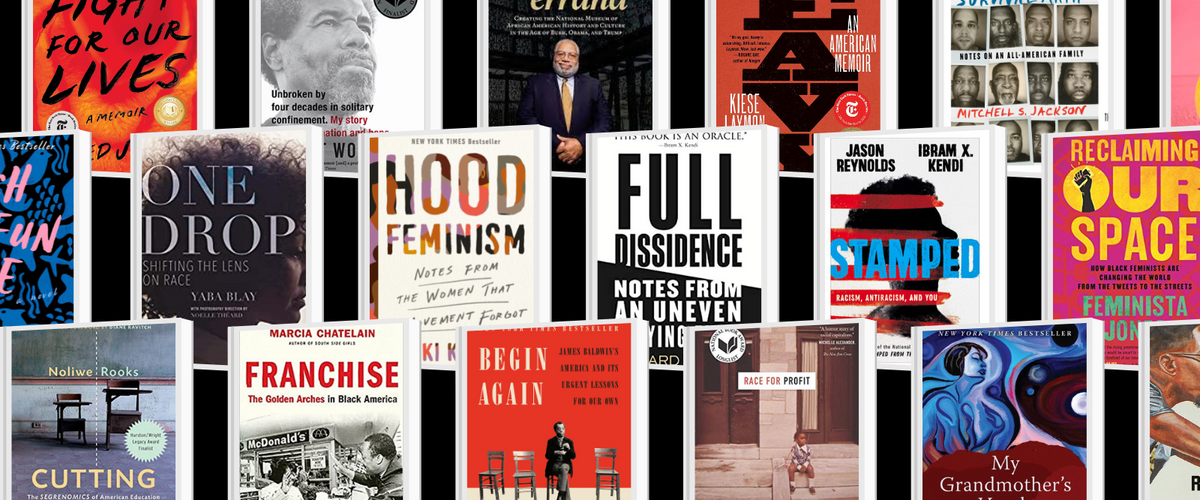Posted June 2022 | Updated May 2023
Hosted every April through Boston University’s Center for Antiracist Research, the National Antiracist Book Festival highlights and celebrates the nation’s leading antiracist authors. The 2022 National Antiracist Book Festival was virtual, and panels were organized based on topic, each with authors and a moderator. In honor and celebration of Juneteenth, we’ve compiled a selection of books by Black authors from this 2022’s Antiracist Book Festival. Whenever possible, we highly encourage you to shop local and support Black-owned businesses. If you’re in Boston, you can accomplish both of these goals by visiting Frugal Bookstore, Boston’s only Black-owned bookstore.
To make it easier for you to find books that align with your interests, we’ve separated our selections into four categories: Activism, Memoirs, Fiction, and Systemic & Structural Racism.
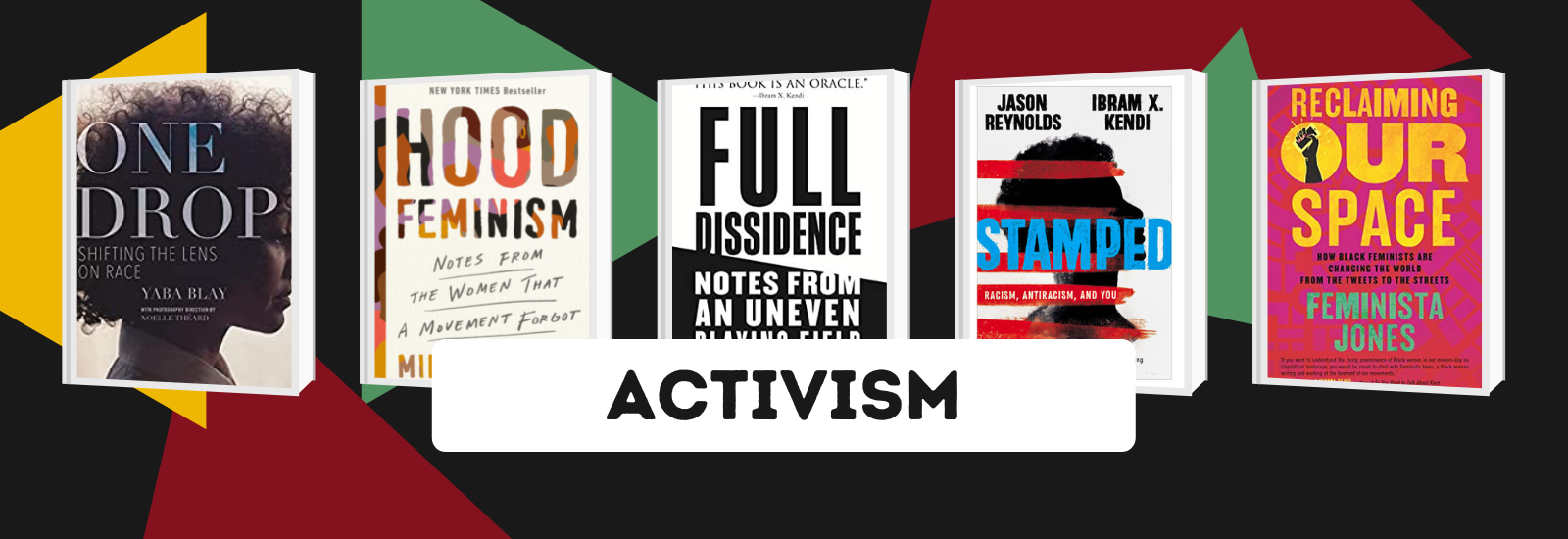
Hood Feminism: Notes from the Woman That a Movement Forgot
by Mikki Kendall
Mainstream feminism often fails to examine the intersections between race, class, sexual orientation and gender. Author Mikki Kendall draws on her lived experiences of hunger, violence, and hypersexualization to address the realities often forgotten by modern mainstream feminism.
Stamped: Racism, Antiracism, and You
by Ibram X. Kendi
Best-selling author, scholar, and founder of Boston University’s Center for Antiracist Research, Dr. Ibram X. Kendi, delivers a full account of how racist ideas were baked into American society, and how they pervade today. Despite confidently shining light on America’s undeniably racist past and present, this remix on Kendi’s original Stamped from the Beginning offers us solutions and hope for an antiracist future.
Full Dissidence: Notes from an Uneven Playing Field
by Howard Bryant
Full Dissidence highlights the ways in which the professional sports industry perpetuates dangerous narratives and drives inequality. In this book, author Howard Bryant confronts the player-owner relationship, militarization of sports, erasure of Black identity as a condition of success, and more.
One Drop: Shifting the Lens on Race
by Yaba Blay
One Drop challenges our ideas of what it means to be Black and explores the range of lived experiences of those who identify as Black. This book sheds light on how historical definitions of race still mold current racial identities, and showcases the true diversity of Blackness.
Reclaiming Our Space: How Black Feminist Are Changing the World from the Tweets to the Streets
by Feminista Jones
Activist, social worker, and cultural commentator Feminista Jones highlights the ways in which Black women are changing and influencing culture. Jones explores how Black women are bringing important conversations into the light about race, class, and gender. Topics that have been happening for decades in the shadows.
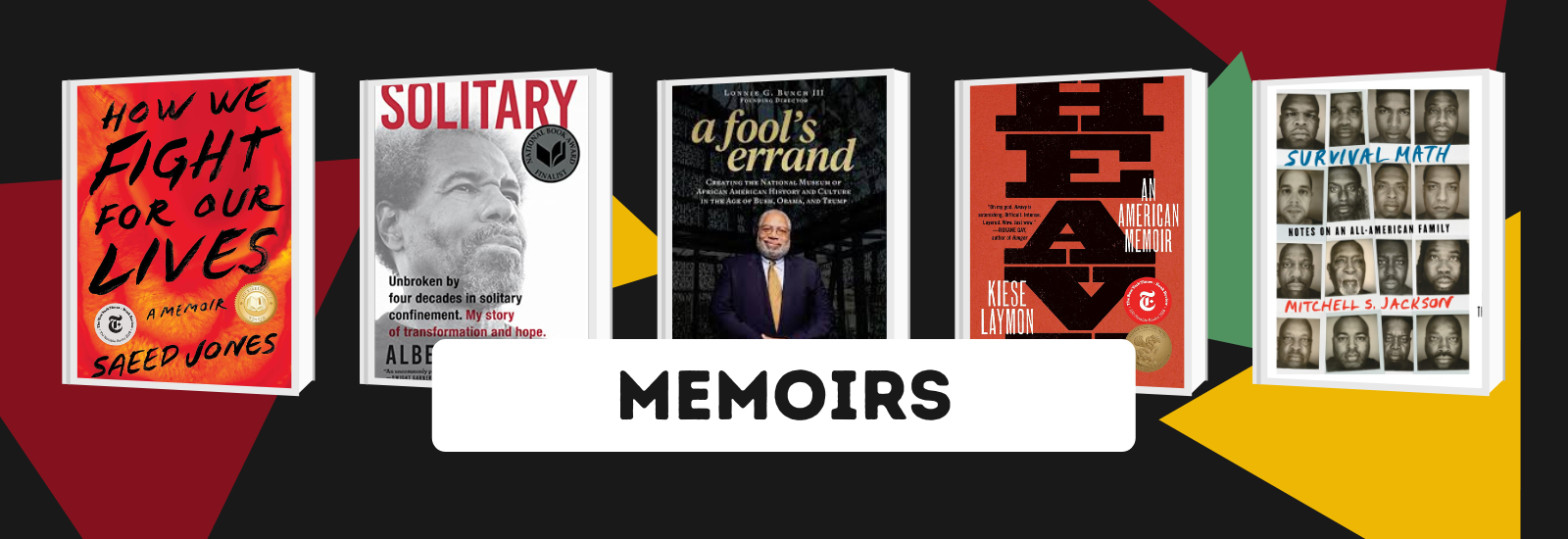
How We Fight for Our Lives
by Saeed Jones
How We Fight for Our Lives is a powerful coming of age story about growing up as a gay Black man in the South. In his memoir, award-winning poet Saeed Jones eloquently chronicles his tumultuous adolescence—from rocky relationships with family, to romantic flings and friendships—Jones fights for his identity, and finds his way back to himself.
A Fool’s Errand
by Lonnie Bunch
In his memoir, author Lonnie Bunch tells the story of how he created the Smithsonian Museum of African American History and Culture. With no mentors or guides, Bunch was confronted with the challenges of designing a building, dealing with a massive collection of artifacts, choosing a location, and more. Bunch’s perseverance helped him realize a dream not only for himself, but for millions of Americans.
Solitary: A Biography
by Albert Woodfox
Albert Woodfox was arrested as a teenager, and already serving a 50-year prison sentence for armed robbery when a white guard at his prison was killed. Albert, along with another prisoner, were accused of the crime, despite there being no evidence against them. Albert served four decades in solitary confinement, but he refused to let it break him. Albert’s story is a remarkable window into the true resilience of the human spirit, demonstrating that with enough stubborn determination, it is possible to survive the unthinkable.
Heavy: An American Memoir
by Kiese Laymon
Heavy is a personal narrative that grapples with the long-term effects of childhood trauma, and how a society so eager to push individuals forward seldom stops to recognize where those individuals have been. Layman writes candidly about his experiences with mental illness, addiction, complicated relationships, and how ultimately, the truth is what sets one free.
Survival Math: Notes on An All-American Family
by Mitchell S. Jackson
Author Mitchell Jackson tells the story of his family, struggle, and circumstances in Survival Math. From gang violence, to addiction, masculinity, hustle, and generational struggle—Jackson showcases not only his story, but the captivating stories of his male relatives.
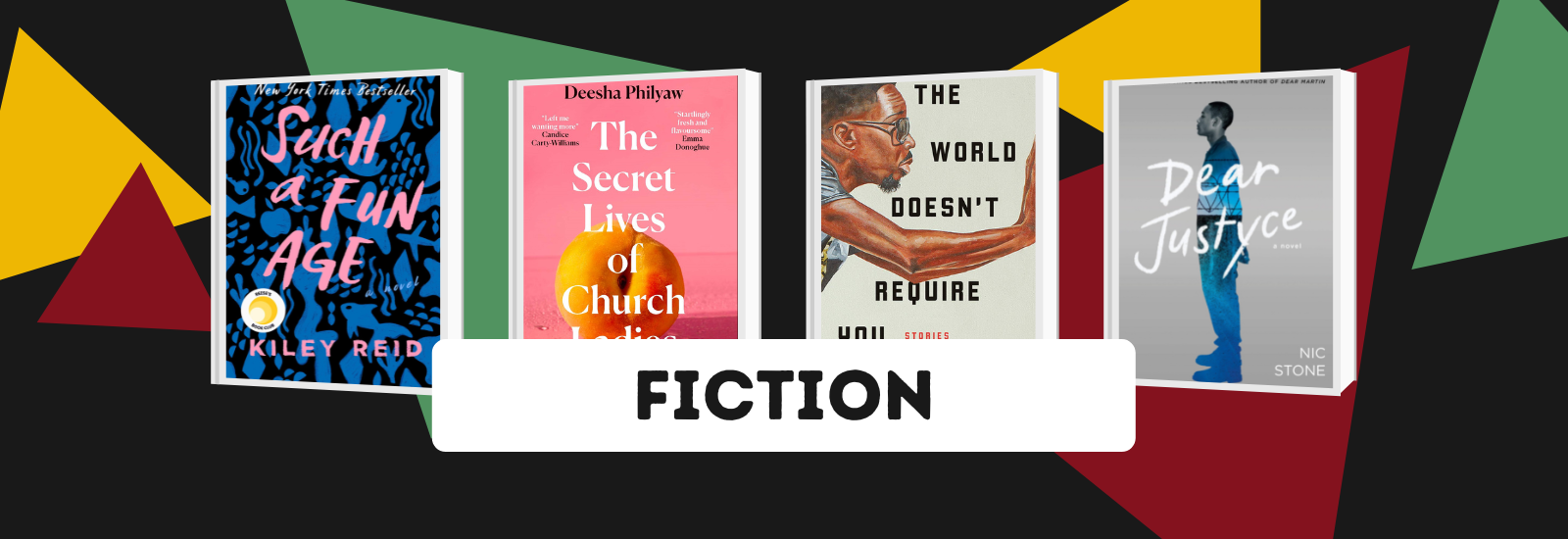
The Secret Lives of Church Ladies
by Deesha Philyaw
Exploring the intersection between Christianity and Blackness, The Secret Lives of Church Ladies provides a collection of captivating short stories about what happens when good, church-going women covertly rebel against the church’s standards to pursue their own desires. The Secret Lives of Church Ladies sheds light on the daring pursuit for personal authenticity and freedom in a rigid, unforgiving culture.
Dear Justyce
by Nic Stone
Dear Justyce is the sequel to Dear Martin, a story about two young Black teens who get into an altercation with the police, and must now face the broken juvenile justice system. Dear Justyce follows protagonist Justyce, now an ivy league student, and his friend Quan, who is in a juvenile detention facility. Stone’s book plots the course of how the criminal justice system fails young adults and creates inequality.
The World Doesn’t Require You
by Rion Amilcar Scott
The World Doesn’t Require You takes place in the area of Cross River, Maryland—founded by rebel enslaved people. Readers are transported into the lives of many different Cross River residents throughout many different generations, and into the struggles they face.
Such A Fun Age
by Kiley Reid
Such A Fun Age tells the story of a young Black babysitter, Emira, who is confronted in a high-end grocery store and accused of kidnapping the toddler in her care. With everything caught on camera, Emira must now face the aftermath of this incident.
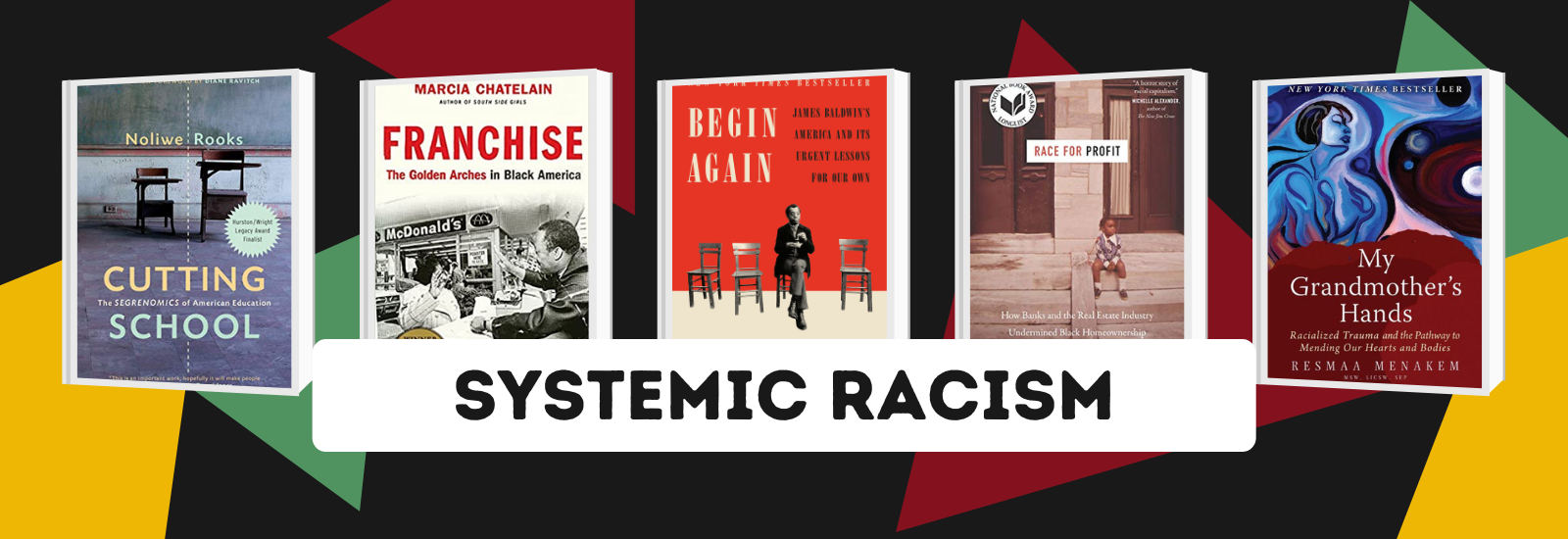
My Grandmother’s Hands: Racialized Trauma and the Pathway to Mending Our Hearts and Bodies
by Resmaa Menakem
Therapist Resmaa Menakem explores the complexity of white supremacy’s lasting effects on us. Through the lens of body-centered psychology, Menakem asserts that racial trauma from white supremacy continues to impact both Black and white Americans, and offers solutions for what we can do to grow beyond this deeply entrenched racial divide.
A Race for Profit: How Banks and the Real Estate Industry Undermined Black Homeownership
by Keeanga-Yamahtta Taylor
In A Race For Profit, author Keeanga-Yamahtta Taylor uncovers the ways in housing discrimination was de jure banned, yet insidiously continued in covert ways. Taylor explains the phenomenon of “predatory inclusion,” and how initiatives to increase Black homeownership resulted in pervasive exploitation.
Franchise: The Golden Arches in Black America
by Marcia Chatelain
Despite the lackluster health outcomes, fast-food chains were once believed to be a solution to racial economic disparities. Chatelain explores the surprising history of how fast-food restaurants came to be so prevalent in Black neighborhoods, and the unexpected cooperation between fast-food companies, civil rights leaders, and Black capitalists.
Cutting School: The Segrenomics of American Education
by Noliwe Rooks
Schools are now more segregated than they have been since the mid-20th century, and author Noliwe Rooks explains how we got here in Cutting School. Rooks outlines the ways in which current solutions to educational equity such as charter schools, online classrooms, and vouchers actually feed school segregation and exacerbate inequality.
Begin Again: James Baldwin’s America and Its Urgent Lessons for Our Own
by Eddie S. Glaude Jr.
In Begin Again, author Eddie S. Glaude Jr. examines parallels between Baldwin’s time and our time through a mixture of biography, memoir, and analysis of America’s current racial landscape. Begin Again draws from newly found Baldwin interviews to assess the ways in which Black resistance has collided with white supremacy and systemic oppression.
